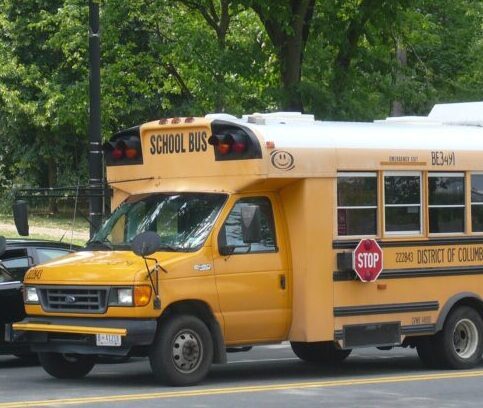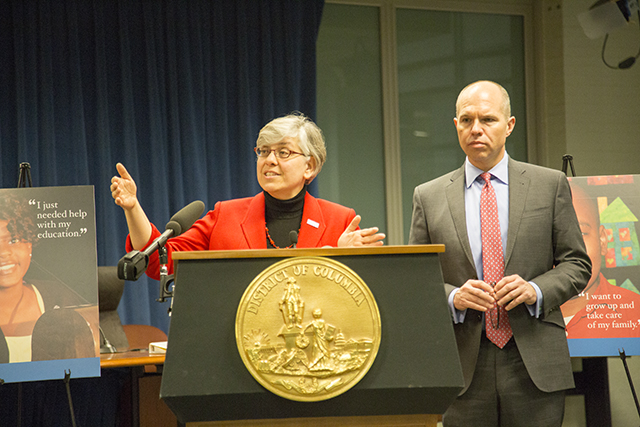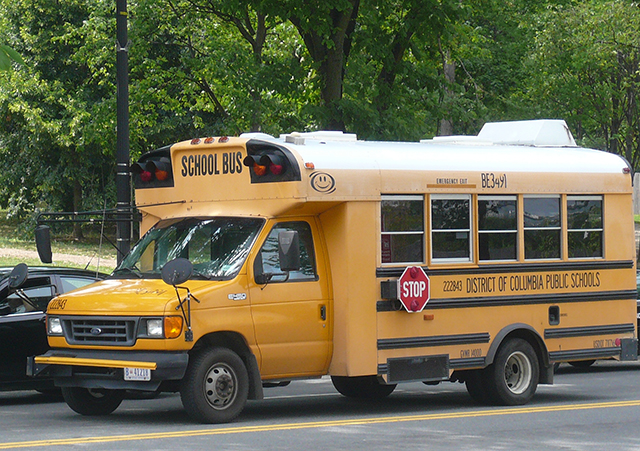DC’s Special Education Reforms: What Next?

Public schools across the District opened their doors to students this week.
For some kids, this means returning to a familiar, supportive environment suited to their needs. For students who struggle in class – especially those with unmet learning disabilities or other special needs – the return to school is a stressful time.
The start of school always heralds an uptick of calls to Children’s Law Center from parents, grandparents, aunts and uncles who are struggling to understand why a school can’t do more to help their child learn. They are not alone. About 13,000 students with identified special needs attend a DC public or public charter school – and DC’s schools have a poor track record of educating them. The latest achievement scores show that students with special needs are far less likely to graduate from high school and continue to lag behind their peers in every measure of school success.
To improve DC’s ability to help all children learn, the DC Council passed three bills in 2014 to transform the special education system. These were the Special Education Student Rights Act, Enhanced Special Education Services Act and the Special Education Quality Improvement Act.
 Judith Sandalow speaks at a 2014 press conference regarding special education legislation.
Judith Sandalow speaks at a 2014 press conference regarding special education legislation.
Children’s Law Center worked closely with the Council’s Education Committee to develop the recommendations which ultimately informed the historic legislation.
“These bills sought to reshape the landscape of special education in DC – to transform it from a pipeline to underemployment and underperformance to a pathway to success and independence,” says Children’s Law Center Executive Director Judith Sandalow.
The reforms became law in March 2015, but while some of the changes took effect immediately, others are just being implemented in the 2016-17 school year. Others still await funding.
Changes in Effect: Keeping Parents Informed & Involved
Some of the key provisions that went into effect in March 2015 intend to make sure parents of children with special needs stay informed and involved with their child’s educational progress.
For example, parents can now go in person to observe their child’s classroom – or send a translator, therapist or other representative who can help them understand whether services are meeting their child’s needs.
DC schools must also provide parents with copies of written documents, including progress reports and drafts of Individual Education Programs (IEPs), five days before an IEP meeting. And the final drafts must be provided within five days after the meeting.
But while these, and other changes, are now enshrined in law, more work is needed to make sure all schools comply.
“In practice, we find that schools often fail to provide parents with all the required documents within the 5-day time frames, although we work to educate and remind them about the deadline” says Children’s Law Center Senior Policy Attorney Renee Murphy.
New for the 2016-17 School Year: Legal Process Changes
Other parts of the law went into effect in time for the upcoming school year and are mostly related to the specific legal process once a dispute has landed parents and schools into administrative court.
One important change helps make sure the legal fight for a child’s education doesn’t bankrupt families – and levels the playing field for lower income families who can be intimidated by the cost of hiring experts to help them prove their case. In court proceedings beginning after July 1, 2016, parents who win a school hearing can now recover up to $6,000 in expert witness fees.

In addition, once a family has demonstrated a prima facie case – in other words, once they’ve presented sufficient evidence that the program or placement isn’t or won’t be appropriate for their child – then the burden of persuasion shifts to the schools to prove their proposal isn’t in violation of the federal Individuals with Disabilities in Education Act (IDEA).
This provision was included because parents often do not have access to the information necessary to carry the full burden of proof. The specific guidelines for the burden of persuasion shift are still being finalized with the Office of Dispute Resolution within the District’s education agency, OSSE. Children’s Law Center is working to ensure that the guidelines effectively implement the law’s intent.
What’s Left: Getting Children Services Earlier and Faster
Each day a student spends without the help they need to learn puts them further and further behind in a classroom. But today DC schools can take 120 days to evaluate children referred for a special education evaluation – which is four months, and far behind most other school districts in the nation.
The new law would require evaluations within 60 days from parental consent or within 90 days of a referral.
The importance of this change cannot be overestimated. The 120 day time frame, which wipes away more than half a school year, is far too long and results in the loss of too many days that children spend languishing, unable to learn.
However, this provision will only go into effect once funding is available. Unfortunately, the Mayor and DC Council failed to incorporate that funding into the most recent District budget.
The same is true for important changes to early intervention services, which target kids from birth to age three – a critical time of rapid brain growth.
As it stands, DC infants and toddlers must show a 50 percent delay in one developmental area (like walking or talking) or a 25 percent delay in two areas to qualify for help from the District government. The law would have changed these requirements so young children with a 25 percent delay in one area qualify – about 1,000 more children. This provision also wasn’t funded for the current school year.
Finally, the law specified that if the DC Council allocated funding, schools must begin preparing students with special needs for adulthood at 14 rather than 16. This critical change would give students and their family more time, skills and support for the future.
“When a student gets their first transition plan at 16, they have often missed out on chances to enroll in specific classes or vocational programs or to pursue internships and supported work opportunities, any of which is helped by good transition planning,” says Murphy.
To date, this provision hasn’t been funded.
To see the full summary of changes to DC’s special education law, both in effect and yet to be funded, click here.
Moving Forward
Children’s Law Center will continue to work with the Mayor and DC Council to advocate that the remaining changes to the special education law go into effect as soon as possible.
Additionally we’ll continue making sure that changes now in effect are implemented in accordance with the law – so that every child in DC can reach their full potential.
To learn more about our trainings for pro bono attorneys who handle special education matters, click here.
“We have waited for decades for special education reform – decades during which children have grown up and left school without the skills to support themselves,” says Sandalow.
“The time is overdue for the District’s children and families to get the quality education they deserve.”
